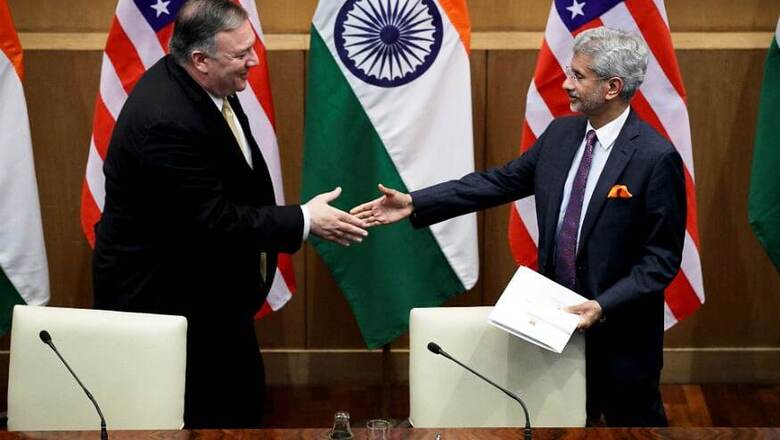
views
Washington: It is important for the larger India-US relationship to have some "early results" to address concerns on the bilateral trade issues, External Affairs Minister S Jaishankar and his American counterpart Mike Pompeo agreed here during a meeting.
Trade tensions between India and the US have been rising with American President Donald Trump complaining that tariffs imposed by New Delhi on American products were "no longer acceptable".
Trump, championing his 'America First' policy, has been a vocal critic of India for levying "tremendously high" duties on US products. He has described India as a "tariff king".
Jaishankar met Pompeo on Monday and they held talks on several bilateral, regional and global issues. "Both of us felt that while trade issues have progressed, for the larger relationship it was important (that) we see some early results out there," Jaishankar told reporters about his meeting with Pompeo.
Commerce Minister Piyush Goyal and US Trade Representative Robert Lighthizer are talking to each other and discussing the details on how to address some of the trade issues between the two countries, he said, even as he refrained from sharing details of the trade talks, noting that this is an ongoing negotiations.
India is demanding exemption from high duties imposed by the US on certain steel and aluminium products, resumption of export benefits to certain domestic products under the Generalised System of Preferences (GSP), greater market access for its products from sectors, including agriculture, automobile, auto components and engineering.
The US terminated India's designation as beneficiary developing country under the Generalised System of Preferences (GSP) programme on June 5. India has been the single-biggest beneficiary of the GSP programme, allowing the country to export USD 5.7 billion worth of duty-free goods in 2017, according to figures from US Congress.
On the other hand, the US wants greater market access for its farm and manufacturing products, dairy items and medical devices, and cut on import duties on some ICT products. The US has also raised concerns over high trade deficit with India.
India imposed retaliatory tariffs on 28 US products including almonds and apples from June 5, after the Trump Administration revoked its preferential trade privileges.
In 2018-19, India's exports to the US stood at USD 52.4 billion, while imports were USD 35.5 billion. Trade deficit dipped from USD 21.3 billion in 2017-18 to USD 16.9 billion in 2018-19.
Describing his meeting with Pompeo as "very comfortable one", Jaishankar said part of it was about discussing various bilateral issues. "In a way we were doing stock taking of Prime Minister Modi's meeting with (President) Trump (in New York) last week," he said.
Over the next two days, Jaishankar is scheduled to meet for the first time the new Defense Secretary Mike Esper and also with the new National Security Advisor Robert Charles O'Brien to discuss a range of bilateral, regional and global issues.
On his maiden visit to Washington in his capacity as the External Affairs Minister, Jaishankar is also scheduled to meet Acting Homeland Security Secretary Kevin McAleenan.
On October 2, he will attend an event at the US Library of Congress to commemorate the 150th birth anniversary of Mahatma Gandhi, which would be attended by Speaker of the US House of Representatives Nancy Pelosi and several other lawmakers.
"Congress has been really the most supportive of all the institutions in America in the last 25-30 years," he said. The top Indian diplomat will interact with over half a dozen top think-tanks in addition to the members of the corporate world at two different sessions being hosted by US India Business Council and US India Strategic and Partnership Forum.
The idea is to "share with them" the thinking of the Indian government post-election. He is also scheduled to interact with members of the Atlantic Council, Heritage Foundation and Brookings Institute. He is scheduled to address the Center for Strategic and International Studies think-tank.
On Monday, Jaishankar interacted with members of the Carnegie Endowment for International Peace. He also met Senator Chris Van Hollen. They also discussed "immediate region" and the larger Asian landscape, including South East Asia and the Gulf.

















Comments
0 comment